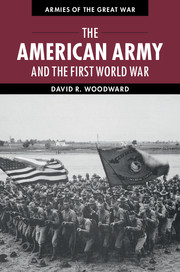Book contents
- Frontmatter
- Dedication
- Contents
- List of figures
- List of maps
- List of tables
- Preface
- List of abbreviations
- Introduction
- 1 Birth of a modern army
- 2 World war and American preparedness
- 3 Coercive power and Wilsonian diplomacy
- 4 “You’re in the army now”
- 5 US army doctrine and industrialized trench warfare
- 6 Over where?
- 7 American Expeditionary Force organization, overseas training, and deployment
- 8 Will the Americans arrive in time?
- 9 Failed expectations: “the military establishment of the United States has fallen down”
- 10 Atlantic ferry
- 11 Neck of the bottle
- 12 Uncertain times
- 13 Cantigny
- 14 Into the breach
- 15 American soldiers in north Russia and Siberia
- 16 The beginning of the end
- 17 Establishment of the American First Army and Saint-Mihiel
- 18 Meuse-Argonne, September 26–October 31
- 19 Breakout, November 1–11
- 20 Epilogue
- Notes
- Bibliography
- Index
6 - Over where?
Published online by Cambridge University Press: 05 July 2014
- Frontmatter
- Dedication
- Contents
- List of figures
- List of maps
- List of tables
- Preface
- List of abbreviations
- Introduction
- 1 Birth of a modern army
- 2 World war and American preparedness
- 3 Coercive power and Wilsonian diplomacy
- 4 “You’re in the army now”
- 5 US army doctrine and industrialized trench warfare
- 6 Over where?
- 7 American Expeditionary Force organization, overseas training, and deployment
- 8 Will the Americans arrive in time?
- 9 Failed expectations: “the military establishment of the United States has fallen down”
- 10 Atlantic ferry
- 11 Neck of the bottle
- 12 Uncertain times
- 13 Cantigny
- 14 Into the breach
- 15 American soldiers in north Russia and Siberia
- 16 The beginning of the end
- 17 Establishment of the American First Army and Saint-Mihiel
- 18 Meuse-Argonne, September 26–October 31
- 19 Breakout, November 1–11
- 20 Epilogue
- Notes
- Bibliography
- Index
Summary
Shortly after America entered the war Major Palmer E. Pierce, one of Baker’s aides, appeared before the Senate Finance Committee to give the War Department’s estimated cost of maintaining and equipping an army of 1 million men. His list was long and included “clothing, cots, camps, food, pay, medical supplies, haversacks, blankets, slickers, cooking outfits, horses, mules, motor trucks, gun carriages, all forms of transportation, airplanes, balloons, marching equipment, guns, rifles, pistols, tanks, gasmasks …” The anticipated cost, $3 billion, was equally astonishing to the Senators. “Why so much?” asked Chairman Thomas S. Martin of Virginia. When Pierce responded by suggesting that the United States might have to maintain an army in Europe, Martin was stunned. “Good Lord!” he sputtered. “You’re not going to send soldiers over there, are you?” Major Pierce responded by telling members of the Senate Finance Committee that sending a US force to Europe might “be the only way to win the War.” This, however, was a decision not yet made by the government. Nor had any decision been made over the theater in which an American force might fight if dispatched across the Atlantic.
Prior to Germany’s resumption of its all-out U-boat campaign, the General Staff’s war planning had focused entirely on the defense of American soil, with one exception. Captain Edward Davis, an American military attaché in Greece, had sent a series of reports to the War Department in November and December 1916 advocating the dispatch of an American expeditionary force of 500,000 men to the Balkans. Captain Davis did more than share his strategical views with the War Department. He approached General Maurice Sarrail, the Allied commander-in-chief on the Balkan Front. Not surprisingly, Sarrail enthusiastically endorsed a proposal that might strengthen his front with 500,000 fresh American soldiers.
- Type
- Chapter
- Information
- The American Army and the First World War , pp. 85 - 105Publisher: Cambridge University PressPrint publication year: 2014



